Schoolgirls In Northeast Nigeria May No Longer Struggle To Write JAMB
The likelihood of failing tests via computers is a huge possibility for girls in Nigeria’s northeastern region due to the lack of digital skills. But an organisation in the region has begun the process of changing this.
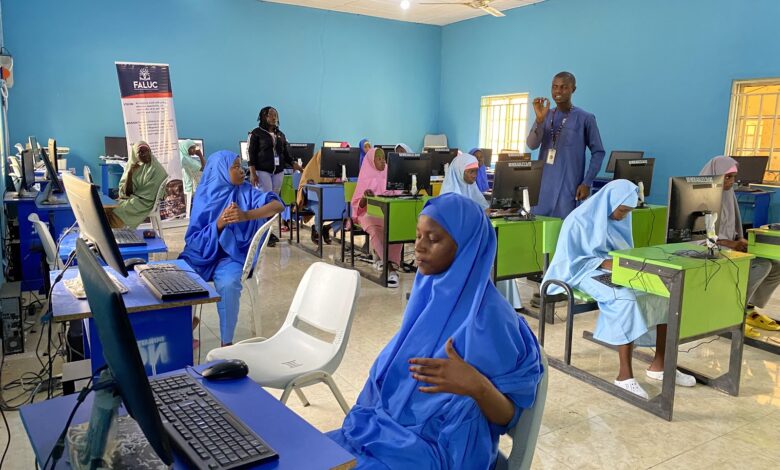
A girl in a pink hijab focuses intently on her assigned computer. Her name is Nusaiba Sunusi, an SS1 student at Yerwa Government Girls Secondary School.
Nusaiba tells HumAngle the tales she has heard of girls who fail their Joint Admission Matriculation Board (JAMB) e-tests because they could not use the computers.
“But I know that I can pass my CBT [Computer-Based Test] now that I know how to use the mouse, keyboard, and so many other things,” she continues.
The examination, conducted by the Joint Admissions and Matriculation Board (JAMB), is a compulsory test that all secondary school graduates in Nigeria must sit for before they can qualify for admission into the tertiary institutions of their choosing. The test, which candidates sometimes fail on the first attempt, has made tertiary education even more unattainable for under-served students who do not have basic computer knowledge and must fidget their way through the test, failing a lot of the time.
But after participating in a 10-week-long computer training organised by Foundation for Alternative Learning in Under-served Communities (FALUC), Nusaiba is confident that she will not be one of those who fail for a lack of computer knowledge.
Abdulqadir Ahmed, co-founder of FALUC, a non-profit organisation tells HumAngle that the issue is even more challenging for girls, hence, the decision of his organisation to organise computer training at Yerwa Girls Secondary School, an all-girls boarding school in Maiduguri, northeastern Nigeria, which has been most affected by the Boko Haram insurgency.
Founded in 2020, the aim of FALUC is described by its founder as providing alternative pathways to access basic foundational skills for under-served young people in Nigeria’s northeast.
“In our case, we are focusing on basic education and at times literacy numeracy just to ensure that young people who are underserved are not growing up without the skills to read and write,” Ahmed says.
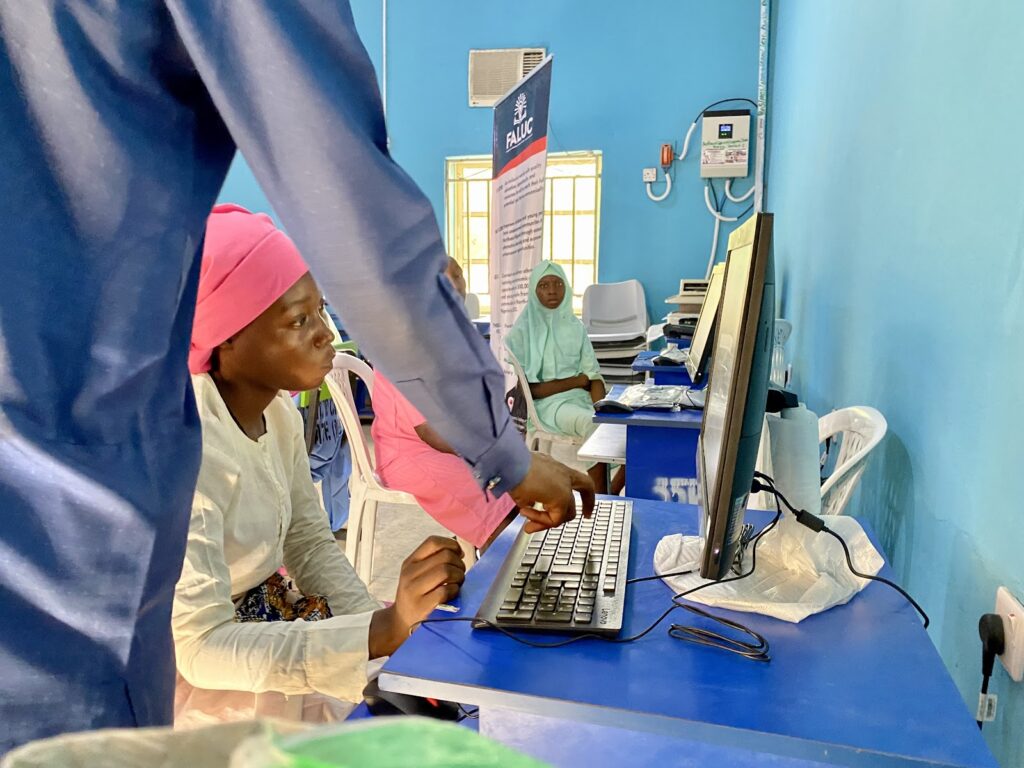
Girls are naturally excluded
In the course of providing said foundational skills for less privileged children, Ahmed’s organisation has met some roadblocks and peculiarities.
In some displaced communities, for instance, they found that girls were forbidden from engaging in any sort of informal learning activities. This is not because the community leaders and parents did not recognise the importance of education and digital skills for girls, but because they did not want them mingling with boys in the same space.
In order to ensure that the concerns of parents and community leaders are addressed, Street2School began to create more culturally sensitive programmes that will ensure that girls are not inadvertently excluded from getting educated.
“In cases where it is not possible to get the boys and girls together in the same place, we allow it to be a girls-only programme or a boys-only programme, just like the one we did in Mashirami settlement; We had already started and the boys and girls were in the same class but the parents complained so we had to separate them,” he recalls.
Ahmed notes that girls are often excluded from education by virtue of the economic weakness of their families so that more often than not, the education of the boy child is prioritised in cases where the income of the family is insufficient to cover the tuition fees of all offsprings.
“It’s because they think ‘Oh at the end of the day, she will get married, she will get a new family so maybe sending her to school will not be the best alternative for us’,” Ahmed says.
Another factor that leads to the exclusion of girls is the fear of sexual violence and, in this case, community leaders are not the only ones who are worried, the girls are too.
Ahmed notes that these fears are not unfounded as there have been real cases in the past. He gave the example of a not-so-distant occasion where girls in a certain Internally Displaced Persons (IDP) camp where girls (who were attending some education programmes in the camp) were sexually exploited by older adults.
In order to encourage the girls to come out and to persuade their parents to release them, Ahmed’s organisation hired facilitators who were mostly women and were community members themselves. They also made sure to situate the training venue closer to the camp management committees’ end so that parents and leaders are involved in the process.
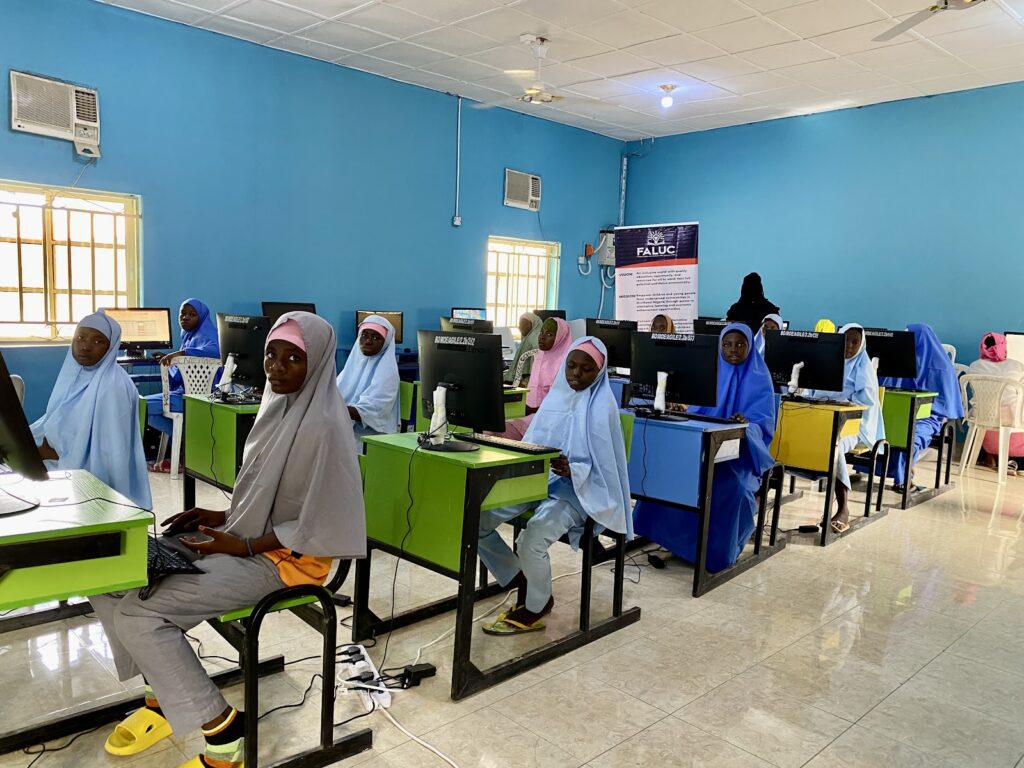
Why the 10-week-long digital training?
FALUC tells HumAngle that its training conducted in Yerwa Girls Secondary School is an effort to ensure continuity in the education of girls in Northeast Nigeria as some of them never progress to tertiary institutions due to some difficulties. These include their inability to successfully sit for the Computer Based Test (CBT) for a lack of basic computer skills and knowledge.
“What I am saying is not that they don’t know the answers to the questions that they are being asked, but because they don’t have the confidence because they have never used a computer before, they find it difficult to respond to questions,” Ahmed says.
Gideon Ogooluwa Omoregha, a digital expert who spoke to The Hope newspapers on ‘Why Brilliant Students Fail JAMB,’ expressed a similar opinion.
“Now, it is no longer a story that JAMB is doing CBT exam and many students who failed JAMB, is not that they are not exceptionally good but as a result of what we call not having resources to practice,” Omoregha said.
The Founder of FALUC emphasises that the issue combined with the already underlying stereotypes about girls, plays a big role in disrupting their education.
“Their parents who are not so convinced about sending their girls to tertiary institutions will now say ‘ok, since you didn’t pass the exam, let’s just sit down and wait for the man that will come and marry you’,” he explains.
FALUC tells HumAngle that the digital skills project took off with 100 students.
Before they were onboarded, a baseline assessment was carried out to determine their level of digital literacy. The assessment was based on three categories namely IT fundamentals (which includes their awareness of laptops, smartphones, internet level awareness, knowledge of emails, Microsoft Excel, PowerPoint, and other basic software tools), digital content information skills (which looks at internet research competence, digital learning awareness, and social media literacy), and digital communication skills (which checks their ability to use digital tools such as Zoom, Google Meet, and branding software like Canva).
After the baseline assessment for internet competence was done, it was found that the girls were lagging behind as only 18 per cent out of the 100 girls showed some significant level of internet research competence. In the area of laptop literacy, only 6% were able to properly turn on laptops and work on them.
After the baseline assessments were administered, a four-day theoretical training was kicked off, and when it was over, a hands-on practical training was designed in view of the outcome of the theoretical part.
The practical training had 40 girls (who were selected as a result of their performance during the theoretical) in participation and were in session for about 10 weeks after which the training ended.
Long-term Impact
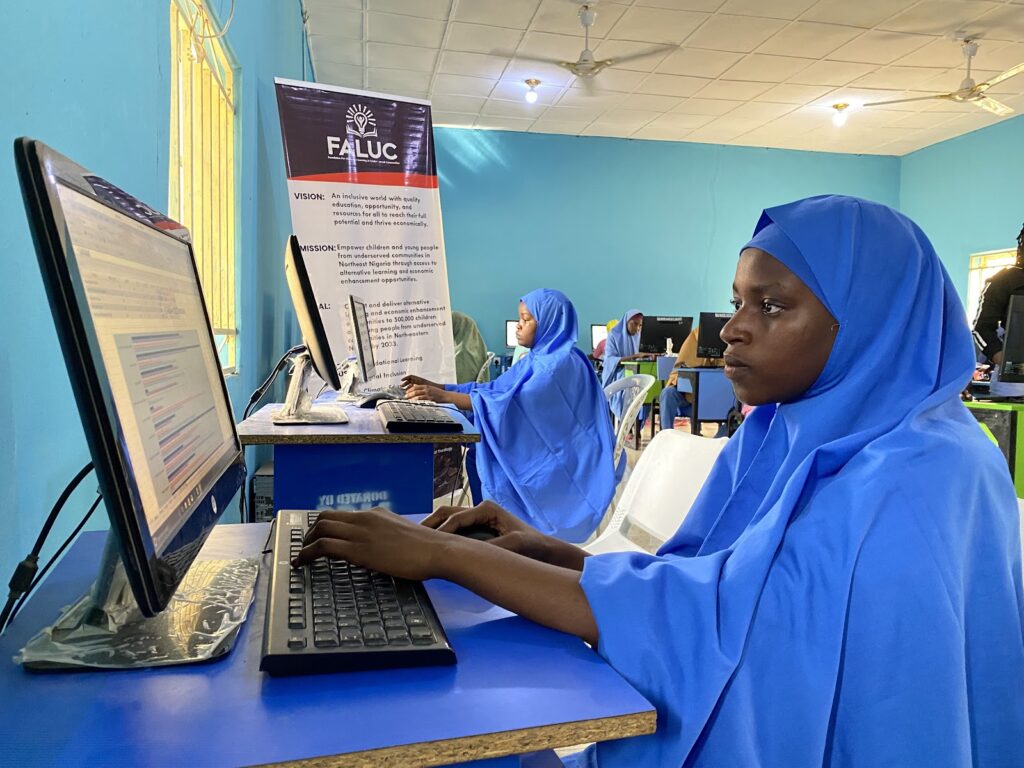
At the moment, it is impossible to determine the long-term impact of the training as this is a flagship programme and the participants are yet to round off from secondary school. They are also yet to register and sit for JAMB CBT. However, there is significant evidence of a short-term impact noted by HumAngle who visited Yerwa Government Girls School on the last day of the training programme.
Hauwa Muhammad, one of students, said that she has not only learnt how to operate a computer in order to take the JAMB tests but has also been able to learn data analysis and data visualisation. She is also able to apply them.
Nusaiba Sunusi also told HumAngle that she has been able to improve on the “very small things” that she knew about Computers before the training.
“Before, I could not create a table but now I can do it,” she said.
“Before, I did not know how to create a meeting on Google Meets but now, I am now able to do that,” she said, going on to list other things that she is able to do, thanks to the training.
“Now, I can do calculations with the Computer. I can calculate the average scores of students, and I can type now too, another student, 16-year-old Hafsat Muhammed Abubakar said.
Additionally, a comparison of the baseline assessment results with administered tests after the theoretical programme showed that a lot of learning had been done on the part of the girls.
For instance, while the results of the internet research tests initially showed 18 per cent, there was a 41 per cent increase because, at the end of the theoretical training, 59 per cent of them showed competence in internet research.
While only six per cent of the schoolgirls were able to turn on and use a laptop, 50 per cent of them were able to do so by the end of the four-day training.
“So you see, all these figures give you a sense that yes, in the short term, the solution of the project is already giving results before the long-term assessment,” the founder of FALUC says.
Ahmed adds that the training was done in such a manner that it will not only aid the girls in securing admission to tertiary institutions but also equip them with skills that will keep them gainfully employed in the event that other circumstances such as poverty and lack come in the way of their education.
“We have been able to equip them with digital skills that enable them to learn on their own and set up their entrepreneurship,” he says.
“Girls that are able to do graphic design even without furthering their education, are able to get some petty jobs and if they develop their skills further can get advanced jobs even without their certificate,” he explains.
While FALUC is currently unable to estimate or directly state the long-term impact of its digital skills programme, they have thought of a way to do so.
“We have their [the girl’s] details, they are trackable, so we have put mechanisms in place to see how many of them were able to register and write JAMB, as well as what the process and outcome looked like,” he says.
Way forward
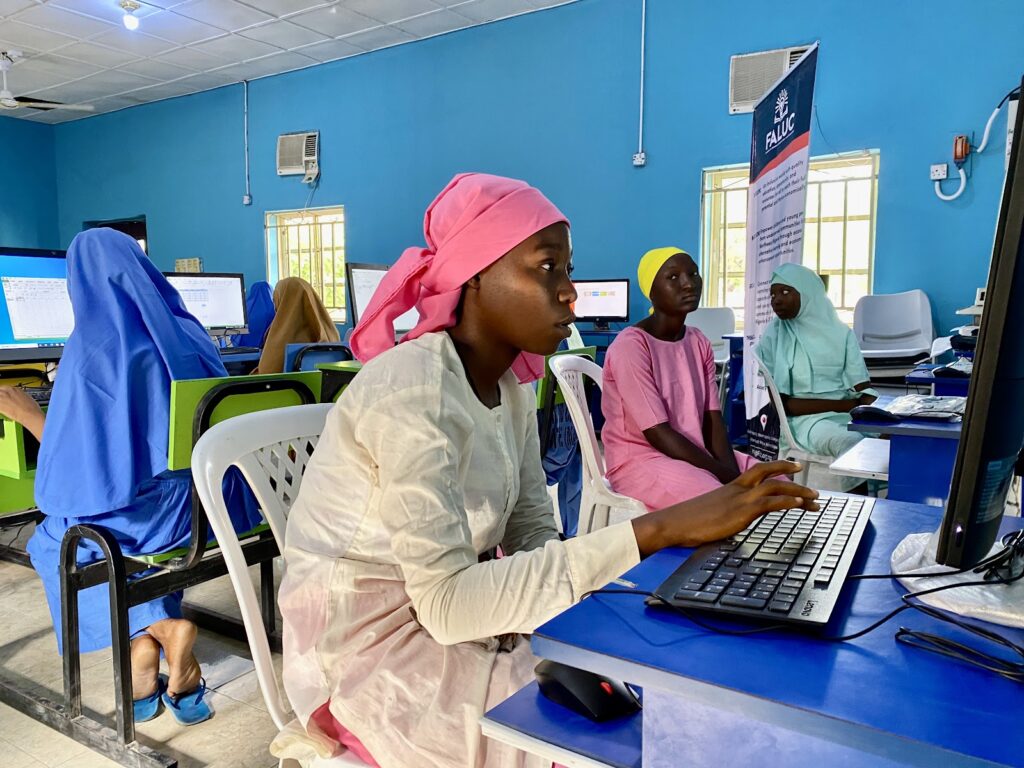
A major challenge FALUC faces is the unavailability of computers in secondary schools in the state.
Ahmed explained that his organisation was only able to hold the training at the Yerwa Girls Government schools because it has more computers than some schools.
But it was not without difficulties.
“Before we started, we had to do some things because some of the computers had become something else due to the fact that they were not in use,” he says.
“We had to remove some cables from some computers, join them with another UPS from some other computers in order to get things working.”
Another challenge is the unavailability of professionals to teach computer studies in schools.
A good instance is Yerwa Government Girls School where only one class (commercial class) is being taught Computer studies.
“That shows that the school knows they don’t have enough computers to be able to do it for every child in the school,” Ahmed says.
In the same vein, only three teachers in the school are able to take the students through Computer Studies. To add to this shortcoming, the teachers also have to take on other subjects and are, therefore, not able to solely focus on teaching them digital skills.
“It will be a case of investing in technology without investing in human resources and this can hinder the desired end result,” he continues, adding that part of their advocacy is to ensure that schools in Northeast Nigeria not only get sufficient computers but also accompanying professionals who will teach students how to use them.
Bearing in mind the issues at hand, the organisation designed their sustainability plan to be adaptive and accommodative of the peculiarities.
“They will need to keep learning because it’s a skill that they will need to continue developing. If it’s just a one-off thing, they will just learn for this week and by next week they’ve forgotten what they have learnt. Part of our sustainability plan is to see that we have a girls’ digital club in the schools where computers and computer labs are available.”
While the main aim of the training is to foster continuity in girlchild education (by ensuring they have the required digital skills to take the compulsory JAMB test), the knowledge gained by the girls has made some of them show more enthusiasm in pursuing Science, Technology, Engineering, and Mathematics (STEM) related careers as the training has demystified the use of computer for them.
“Most computer users are men and this is because women did not have the privilege to study before but now we have the privilege and I believe that women can do it as well as men do,” 17 year old Hauwa said to HumAngle, adding that most women mostly decide to study Biology and the likes as they feel that Computer will be difficult to get into.
She added that she has the passion to study Computer Engineering at the university because “I know that I can do it. I am advising other females who want to study computer-related courses to pursue it because there is nothing that you cannot do.”
Other career choices mentioned by the girls include Chemical Engineering, Data Science, and Software Engineering.
“I’m as surprised as you are,” Ahmed says. “It’s one thing to say you want to be a computer engineer and it’s another thing to say you want to be a data scientist. You already know that this is the particular field under STEM that you want to go into.”
Support Our Journalism
There are millions of ordinary people affected by conflict in Africa whose stories are missing in the mainstream media. HumAngle is determined to tell those challenging and under-reported stories, hoping that the people impacted by these conflicts will find the safety and security they deserve.
To ensure that we continue to provide public service coverage, we have a small favour to ask you. We want you to be part of our journalistic endeavour by contributing a token to us.
Your donation will further promote a robust, free, and independent media.
Donate HereStay Closer To The Stories That Matter




